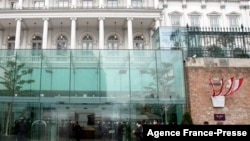The seventh round of negotiations over a mutual return to compliance with the Joint Comprehensive Plan of Action, or JCPOA, by the United States and Iran adjourned on December 17 in Vienna.
U.S. National Security Advisor Jake Sullivan said that although the last few days before the adjournment “brought some progress to the bargaining table,” the talks are “not going well, in the sense that we do not yet have a pathway into the JCPOA.”
Before the most recent round of negotiations began on November 29, there was a five-month hiatus ostensibly caused by the arrival of a new presidential administration in Iran. When Iran returned to the talks, it offered proposals that walked back compromises the former Iranian administration had made, causing the E3 countries -– France, Germany, and Britain –- as well as the United States, to accuse Tehran of a lack of seriousness.
The United States and the E3 agree that some technical progress was made shortly before the recent adjournment. U.S. and E3 officials say there is now at least a common understanding about the text of proposals that will serve as a basis for further negotiations. But National Security Advisor Sullivan expressed frustration that getting Iran’s nuclear program “back in the box has proven more difficult over the course of this year than we would like to have seen.”
What is particularly alarming is that since 2019, Iran has aggressively expanded its nuclear program beyond the JCPOA’s limits. It is enriching uranium to 60 percent purity and has limited its cooperation with the International Atomic Energy Agency.
The United States and the E3 countries have expressed deep concern that Iran’s nuclear advances could soon reach a point where, in the words of the E3, the JCPOA could “become an empty shell.”
One bright spot in the recent round of talks, said National Security Advisor Sullivan, is that all of the P5+1 countries, including China and Russia, are united in recognizing and expressing “the urgency of getting to a deal. . . . There is a shared view among the world powers that we have to prevent Iran from acquiring a nuclear weapon. Doing so through diplomacy,” he declared, “is the best way, and if we don’t get a diplomatic outcome, the alternatives are deeply problematic. So that gives [the Iranians] some motivation to try to push for resolution at the bargaining table.”














